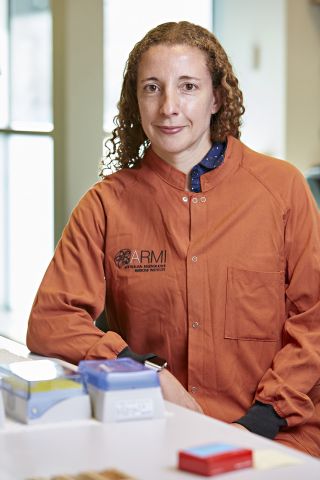Jihane Homman-Ludiye: ‘Pursuing Neurobiology Was a ‘No-Brainer’

Come December, Dr Jihane Homman-Ludiye will be celebrating her 10 year anniversary at ARMI. We can’t believe how fast the time has flown – nor how many contributions she’s made to the institute. As a postdoctoral researcher in the Bourne Group, Jihane dedicates her working life to expanding the frontier of neurobiology research, an area in which she is very passionate.
The Bourne Group, headed by Associate Professor James Bourne, seeks to be at the forefront of understanding brain plasticity, development and repair; essential fields for developing novel treatments in areas spanning from schizophrenia to stroke and brain injury. For group member Jihane, her speciality delves into the developmental side, where she focuses on understanding the mechanisms underlying brain formation in early development and how disruption of these processes affects the functions of the adult brain and increases the risk of cognitive disorders.
“It’s an exciting field”, commented Jihane. “We’re investigating a brain structure named the medial pulvinar, about which there is little knowledge – except that it is only present in humans and our close primate relatives, and that it feeds information to the frontal regions of the brain that are responsible for higher cognitive functions such as attention and executive functions. The medial pulvinar is consistently abnormal in patients with schizophrenia but no one knows why. We are trying to address this question using a combination of genetic, cellular and behavioural approaches. So far, our results suggest that the medial pulvinar controls the remodelling that occurs in the brain as we grow up, a process that is abnormal in patients. Hopefully, we will soon be able to provide more details on what goes on in the medial pulvinar of patients and how that links with the onset of symptoms.”
Though Jihane’s research promises no immediate cure for those suffering of neurological disorders like schizophrenia, it will lay the foundation for future research into potential treatments and preventative measures. Her research may also refine the current understanding of the disorder and improve its diagnosis – which typically occurs when patients are in their 20’s or 30’s – despite them having the disorder since adolescence.
Considering the contribution Jihane has made to research, it’s strange to think she never pictured herself as a scientist – instead, she wanted to be a veterinarian. But in a twist of fate after failing an exam, Jihane was faced with a year of waiting before resitting. In that time she undertook a placement in a science lab and instantly fell in love with research.
“It was awesome!” exclaimed Jihane, “I did a placement in a lab and realised this is what I wanted to do. It didn’t take me long to be naturally drawn to neurobiology, as I always have been fascinated with how we form memories and how we dream. It was a no-brainer for me!”
After completing a string of impressive university degrees in France, including an undergraduate degree in Cell Biology and Physiology from Denis Diderot University and a PhD at the Salpetriere Hospital in Paris, Jihane joined ARMI in 2008 – after contacting James Bourne directly regarding his research.
Despite the demands of her research and recently becoming a mother to a now 17-month old, Jihane still finds the time to run although she retired from rugby, a love which she brought with her from France. Considering her rugby team her second ‘Australian’ family, Jihane played for Monash University and Powerhouse and was a state representative for Victoria .
Going forward, there is no sign of Jihane slowing down, with plans to continue her research and work towards publishing more research and source funding. For Jihane, any progress toward alleviating neurological disorders that afflict patients is a goal; “if we focus our efforts on better understanding the areas of the brain affected in neurological disorders and why, this could lead to preventative measures and (potentially) cures – only time and more research will tell”.
For more information on Jihane Homman-Ludiye and the Bourne Group at ARMI, please visit the Bourne Group page. You can contact Jihane via jihane.homman-ludiye@monash.edu.
